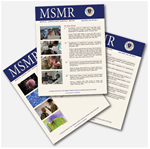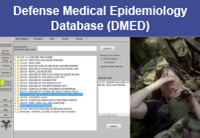Timely, Relevant, Comprehensive and Actionable Health Surveillance
The Armed Forces Health Surveillance Division is the central epidemiologic health resource for the U.S. military. We conduct medical surveillance to protect those who serve our nation in uniform and allies who are critical to our national security interests. AFHSD is a division within DHA’s Public Health.
AFHSD is organized into three branches: Epidemiology and Analysis, Global Emerging Infections Surveillance, and Integrated Biosurveillance. We place emphasis on defense management tools through our Information Technology Support section.
We coordinate and leverage health surveillance resources across the DOD Public Health enterprise to include the Defense Centers for Public Health – Aberdeen (Army), Defense Centers for Public Health – Dayton (Air Force), and Defense Centers for Public Health – Portsmouth (Navy and Marine Corps) for early warning, health threat assessments and force health protection.
Learn how our health information analysis supports worldwide disease surveillance and public health activities to improve the U.S. military’s Force Health Protection mission.
Purpose
To Protect the Total Force from “All Hazard” threats via actionable health surveillance information and support.
Goals
- Be flexible, responsive and predictive to our customers
- Provide early warning capability of global “All Hazard” threat assessment specific to our customers
- Inform risk management decisions across the health surveillance enterprise
Explore our health surveillance resources to learn how to utilize our data applications, systems and the ways our health information analysis supports worldwide disease surveillance and public health activities to improve the U.S. military's Force Health Protection program.
Medical Surveillance Monthly Report
 The Medical Surveillance Monthly Report is AFHSD's flagship publication. The monthly peer-reviewed journal provides evidence-based estimates of the incidence, distribution, impact, and trends of health-related conditions among service members. Additionally, the MSMR focuses one issue per year on the absolute and relative morbidity burden attributable to various illnesses and injuries among service members and beneficiaries.
The Medical Surveillance Monthly Report is AFHSD's flagship publication. The monthly peer-reviewed journal provides evidence-based estimates of the incidence, distribution, impact, and trends of health-related conditions among service members. Additionally, the MSMR focuses one issue per year on the absolute and relative morbidity burden attributable to various illnesses and injuries among service members and beneficiaries.
View Current Report View Archived ReportsArchived Reports
Health Surveillance Explorer
 The Health Surveillance Explorer is a dynamic CAC-enabled mapping application that allows the Geographic Combatant Commands to identify global health threats and disease outbreaks in near-real time. It provides timely, relevant and actionable health surveillance information to military leaders around the globe. The HSE makes it more efficient and effective to assemble surveillance data.
The Health Surveillance Explorer is a dynamic CAC-enabled mapping application that allows the Geographic Combatant Commands to identify global health threats and disease outbreaks in near-real time. It provides timely, relevant and actionable health surveillance information to military leaders around the globe. The HSE makes it more efficient and effective to assemble surveillance data.
Launch HSE
Proposal Management Information System
Defense Medical Epidemiology Database
 The Defense Medical Epidemiology Database provides worldwide access to de-identified data contained in the Defense Medical Surveillance System. Through this user-friendly interface, authorized users can create customized queries of disease and injury rates in active duty populations.
The Defense Medical Epidemiology Database provides worldwide access to de-identified data contained in the Defense Medical Surveillance System. Through this user-friendly interface, authorized users can create customized queries of disease and injury rates in active duty populations.
Go to DMED